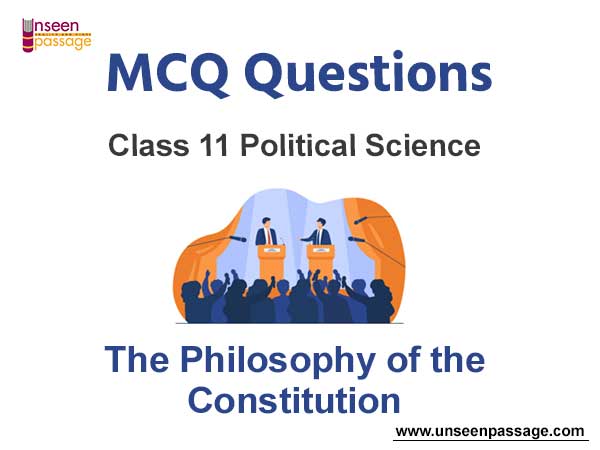The Philosophy of the Constitution MCQ Questions Class 11 Political Science
Please refer to Chapter 10 The Philosophy of the Constitution MCQ Class 11 Political Science with answers below. These multiple-choice questions have been prepared based on the latest NCERT book for Class 11 Political Science. Students should refer to MCQ Questions for Class 11 Political Science with Answers to score more marks in Grade 11 Political Science exams. Students should read the chapter The Philosophy of the Constitution and then attempt the following objective questions.
MCQ Questions Class 11 Political Science Chapter 10 The Philosophy of the Constitution
The Philosophy of the Constitution MCQ Class 11 Political Science provided below covers all important topics given in this chapter. These MCQs will help you to properly prepare for exams.
Question. Democracy is a government of the people, by the people, and for the people. Whose statements is it?
(a) Rousseau
(b) J.S. Mill
(c) T. H. Green
(d) Abraham Lincoln
Answer
D
Question. In the Constituent Assembly of India, the Chairman of the Union Constitution Committee was
(a) Rajkumari Amrit Kaur
(b) G.V. Mavalankar
(c) Pt. Jawaharlal Nehru
(d) Dr. John Mathai
Answer
C
Question. Which one of the following is not an essential feature of a democracy?
(a) Judiciary is responsible to the legislature
(b) Judiciary is independent
(c) The press is free
(d) There is the freedom to express public opinion
Answer
A
Question. Which one of the following Fundamental Rights has been ensured to the citizens of India?
(a) To get education
(b) To get employment
(c) To buy and sell property
(d) To form associations or unions
Answer
D
Question. The Preamble of our Constitution reads: India is a
(a) Socialist, Sovereign, Secular, Democratic Republic.
(b) Secular, Socialist, Sovereign, Democratic Republic.
(c) Sovereign, Socialist, Secular, Democratic Republic.
(d) Secular, Sovereign, Democratic, Socialist. Republic.
Answer
C
Question. Which Article provide the privilege of special status to the North-Eastern State of Nagaland?
(a) Article 371A
(b) Article 371B
(c) Article 371C
(d) Article 371D
Answer
A
Question. Which was the first non-official attempt at drafting a constitution for India?
(a) Constitution of India Bill, 1892
(b) Constitution of India Bill, 1893
(c) Constitution of India Bill, 1894
(d) Constitution of India Bill, 1895
Answer
D
Question. Who argued that a state responsive to the needs of individuals must provide them the means by which their needs are communicated?
(a) Bal Gangadhar Tilak
(b) Rajaram Mohan Roy
(c) Bhagat Singh
(d) Jawahar lal
Answer
B
Question. The Japanese Constitution popularly known as
(a) Complex constitution.
(b) Advance constitution.
(c) Peace constitution.
(d) Concord constitution.
Answer
C
Question. Indian federalism has been constitutionally
(a) Symmetric
(b) Asymmetric
(c) Wide
(d) None of the above
Answer
B
Question. Which of the following word is not mentioned In Indian constitution:
(a) Democratic
(b) Secular
(c) Republican
(d) Federal
Answer
D
Question. The preamble was for the first time amended by the
(a) 42nd Amendment
(b) 44th Amendment
(c) 52nd Amendment
(d) 61st Amendment
Answer
A
Question. which constitution is known as “peace constitution”?
(a) canada
(b) japan
(c) india
(d) sri lanka
Answer
B
Question. The procedural achievement reflects in
(a) Freedom to criticize treatment of widows
(b) Taking decisions in the Constituent Assembly on the basis of reason
(c) Article 370 and 371
(d) Accepting importance of community in an individual’s life
Answer
B
Question. The idea of Preamble is borrowed from
(a) U.K
(b) Germany
(c) Canada
(d) USA
Answer
B
Question. Which of the following term is correct that mean both religion and state must stay away from the internal affairs of one another.
(a) Mutual exclusion
(b) Internal exclusion
(c) Constitutional exclusion
(d) None of the above
Answer
A
Question. what is not included in the political philosophy of the constitution?
(a) norms and values
(b) justification of the values
(c) philosophical character of our constitution framers
(d) conceptual structure of the constitution
Answer
C
Question. what is principled distance?
(a) distance from principles
(b) distance between religion and politics
(c) distance between two ideals
(d) distance by state from religious affairs to the extent of removing only evils
Answer
D
Question. Which of the following principles of secularism are adopted in the Constitution of India?
(a) that state will have nothing to do with religion
(b) that state will have close relation with religion
(c) that state can discriminate among religions
(d) that state will recognise rights of religious groups
Answer
D

We hope you liked the above The Philosophy of the Constitution MCQ Class 11 Political Science. In case you have any questions please put them in the comments box below and our teachers will provide you a response.
